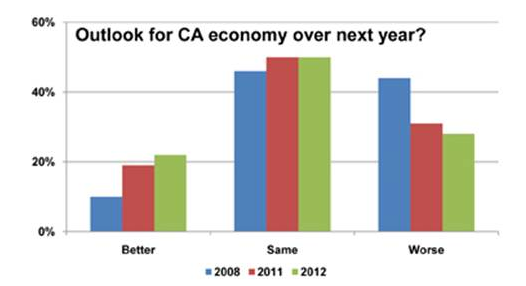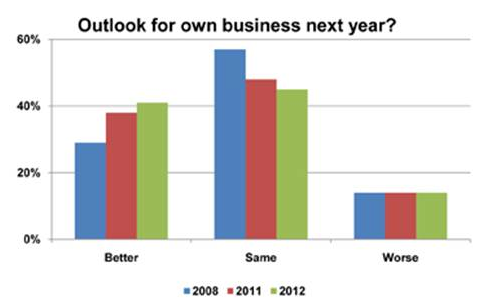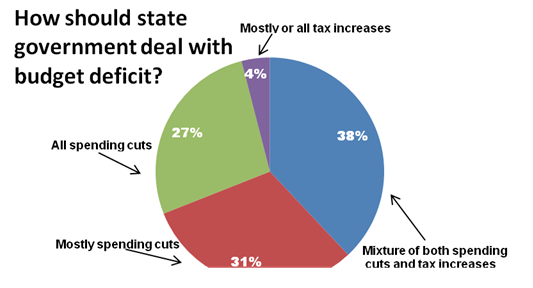The California Foundation for Commerce and Education (of which I am the president) this week released its 2012 survey of business executives detailing current attitudes about the state’s economy, business climate, and budget. The study was sponsored by the California Chamber of Commerce.
The entire survey can be found here.
Business executives are more optimistic about the state’s economy, as well as on the prospects for their own businesses. But they continue to have a poor outlook on the California business climate, mainly citing overregulation as the key culprit.
Economic and Business Outlook
- Business owners and operators are deeply concerned about the direction California has taken: More than four-out-of-five answered that the state is “on the wrong track,” while only one-in five believe California is going “in the right direction.”
- Business owners are slightly more optimistic about the state’s economy and more upbeat about their own business prospects, compared to one year and four years ago, but decidedly more negative over the California business climate.
- While half of business owners said the economy was in poor shape and only 22% said it would improve over the next year, that is a somewhat better response than in 2011, when 61% said the economy was in poor shape and only 19% said it would improve:
- Company owners had a brighter outlook on their own businesses. More than two out of five business leaders said their own business outlook will be getting better next year, compared with only 14% who said it will be getting worse, and 45% who said it will stay the same. This optimistic trend has been increasing since 2008, when only 29% said prospects would be better, and in 2011, when 38% said so.
- Nearly a third of businesses reported adding employees over the past year, compared with just a quarter of businesses in 2011. Fewer firms reported reducing their workforces this year compared to last.
- Looking ahead, 31% of businesses plan on adding employees next year, which was a better outlook than businesses gave in 2011, when only 27% planned on adding new employees. Only 15% of employers plan to reduce their workforces next year.
State Business Climate
- Regarding the business climate, business owners report that it is getting even harder to do business in California than it was one year or four years ago.
- By far and away, employers have identified the biggest challenge to doing business in California as “too much government regulation,” with 64% of respondents saying it’s the first or second biggest challenge.
- High state and local taxes, and the state budget deficit were in the next level of business challenges, identified by 29% and 22% of business leaders, respectively. High health care costs, high labor costs and the difficulty of hiring and maintaining a qualified work force rounded out the biggest concerns of business leaders.
- Climate, weather and quality of life were identified as the top advantages to doing business in California. The state’s leadership in certain industries (high tech, biotech, ag), its culture of innovation, and access to markets were also noted as being strong advantages.
State Government Policies
- According to business leaders, the top priorities for state elected officials should be the economy and job creation, and resolving the state budget deficit. These priorities ranked among the top two issues (46% and 44%, respectively) for business leaders.
- The other high priority issues to be addressed by state leaders should be labor regulations governing overtime, wages and rest periods, and the quality of public schools and higher education.
Health Care
- CalChamber surveys have consistently shown that about 89% of CalChamber members provide health care benefits for their employees. (The offer rate for California businesses as a whole tends to be closer to 60%.)
- For survey respondents who do not provide health care, the primary reasons given are that it’s too expensive or the company is too small.
- The main reason companies say they provide health care benefits is improved ability to recruit and retain employees and that providing the benefits helps employees stay healthy and productive.
- More than half of employers report that their health care premiums increased “a lot” last year.
- Employers’ said their response to these increases will be primarily to increase employee premiums or increase co-pays or deductibles. Few employers report that they will drop health care benefits altogether or restrict eligibility of employees or dependents.
- About a third of employers reported that it was likely they would make no changes to their benefit structures next year.
- Employers are strongly negative about the Affordable Care Act, by about a two-to-one margin.
- While most employers (68%) are aware of the tax credit for small businesses that provide health care to employees, only a minority say that the tax credit will influence whether they will continue to provide (35%) benefits or will begin to provide (34%) new benefits.
State Budget Crisis
- Business leaders continue to say that ongoing state budget deficits are an extremely or very serious problem, but they are split on the optimal solution.
- A majority (59%) of business owners and operators said the budget deficit should be resolved by “mostly” or “all” spending cuts, while 38% said they would prefer a mix of both spending cuts and tax increases.
- When asked which should be the highest priority of an elected leader in dealing with the state budget:
- “Holding the line on taxes, regardless of the impact this may have on the budget or leading to major cuts in services,” remained the choice of a plurality of business owners, by a narrow margin of 37%.
- “Protecting funding for essential services like education, health care and public safety, even if that means higher taxes,” was favored by 35% in 2012 – which is within the margin of error when compared with the previous choice.
- “Balancing the budget, even if that means raising some taxes and making cuts to essential services,” was favored by 28% in 2012.
- Top budget priorities for business leaders remained consistent: K-12 education should be most spared from budget cuts, followed by economic development and job creation, higher education, and courts and public safety.
Policy Reforms
- Top reforms that business leaders said should be part of a legislative budget deal were very consistent with priorities in 2011:
- Ensure that whatever mix of new taxes and spending cuts are adopted, the end result is a truly balanced budget without gimmicks.
- Reform public employee pensions to more resemble private sector 401(k) plans.
- Conform overtime rules to federal law, which would return California to a 40- hour work week before adding on any overtime (rather than on each eight-hour day) to provide workers and employers greater flexibility and savings.
- The next set of priorities included:
- Place a cap on all state spending so it cannot grow faster than the rate of inflation plus population growth.
- With approximately half the state budget going to education, reform the education system to strengthen the role of principals, expand teacher training, ease termination of incompetent teachers, and pay higher salaries to teachers who improve student performance.
- Ensure that one-time revenues cannot finance ongoing state programs.
- The third tranche of reforms included:
- Place a cap of up to 5% of an employee’s salary as the most a public agency can contribute to an employee’s retirement per year.
- Reform environmental regulations to increase certainty and reduce the time to develop a project.
- Provide long-term funding certainty for California universities and colleges to ensure continued innovation and skilled workforce.
- At the bottom of the popularity list was: Release some non-violent criminals early to reduce prison costs.
The California Business Executives Attitudes survey was conducted between February 20, 2012 and March 19, 2012. A total of 699 California business executives were polled for the survey.




